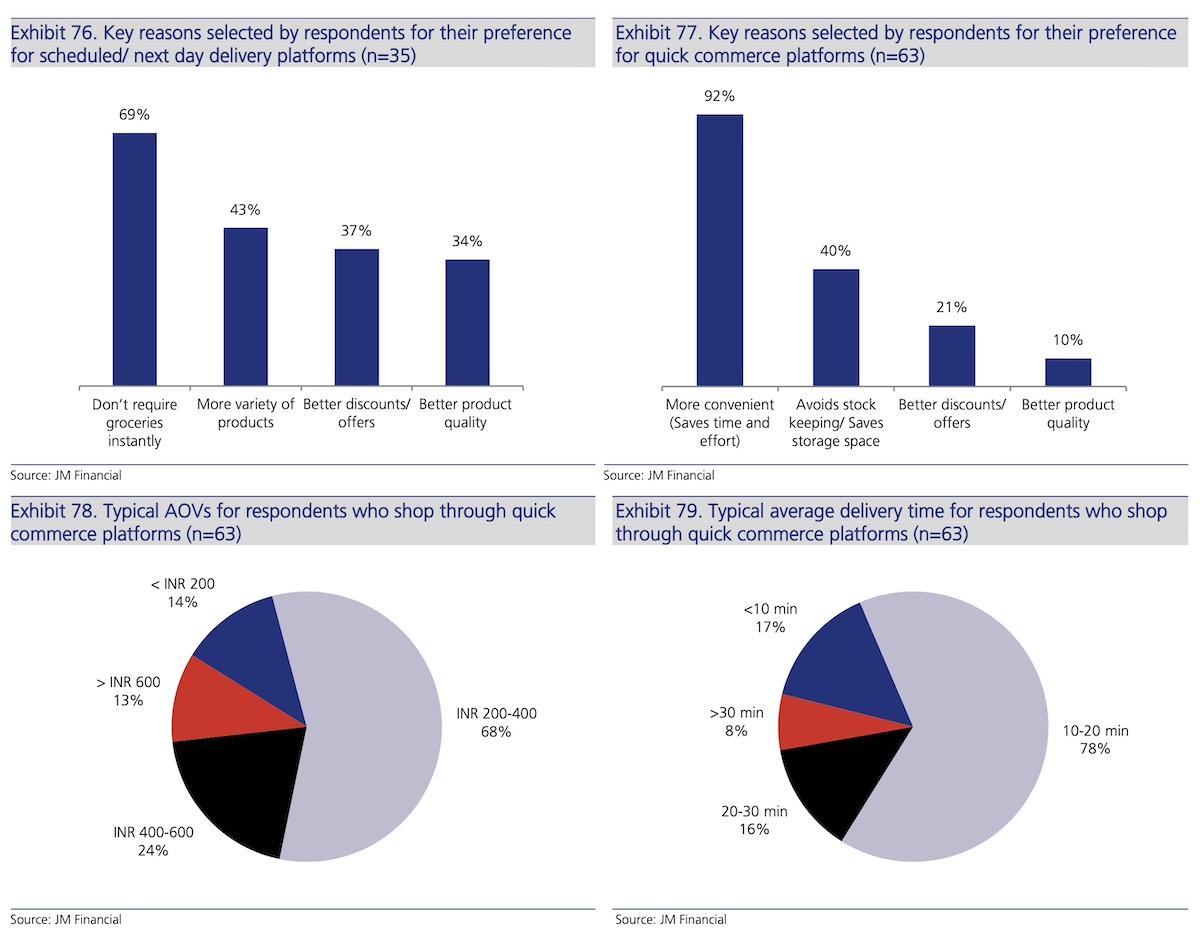ARTICLE AD
Even as quick commerce is slowly fading in many markets and several heavily-funded startups have folded in the past two years, India is emerging as a striking outlier where the model remains vibrant.
India’s quick commerce market has witnessed a staggering 10-fold growth between 2021 and 2023, fueled by the sector’s ability to cater to the distinct needs of urban consumers seeking convenience for unplanned, small-ticket purchases. However, despite this rapid expansion, quick commerce has only captured a modest 7% of the potential market, with a total addressable market (TAM) estimated at $45 billion, surpassing that of food delivery, according to JM Financial.
Zomato’s Blinkit leads the quick commerce market in India, having cornered as much as 46% of the market share by GMV in the quarter that ended in December, according to a new analysis.
Swiggy’s Instamart follows with a 27% share, newcomer Zepto has quickly gained ground, securing 21% of the market and Bigbasket’s BB Now trails with a 7% share, according to brokerage firm JM Financial. Reliance Retail-backed Dunzo, which pioneered the quick commerce model in India, has virtually lost its entire market share.
“With more than 10 active players, the space was very competitive a couple of years back,” JM Financial wrote of the quick commerce market in a recent note. “It appeared that an intense phase of multi- year cash-burn would soon follow. However, contrary to expectations, several players including some well-funded ones folded early in their endeavour. While some faced funding challenges, a few others were affected by structural issues such as lack of product market fit, inability to solve the hyperlocal complexity, inability to build a robust end-to-end supply chain and 4) failure to create a strong brand recall.”
As quick commerce players vie for a larger slice of the market, the success of their ventures hinges on the development of efficient supply chains. Companies are making substantial investments in dark store operations, streamlining inventory management, and establishing direct partnerships with FMCG manufacturers and farmers. By circumventing traditional distribution channels, these firms aim to enhance product quality, expedite delivery times, and boost overall operational efficiency, industry experts said.
Dark stores, the backbone of quick commerce operations, have significantly expanded their product offerings, now carrying over 6,000 SKUs per store, a substantial increase from the 2,000 to 4,000 SKUs they housed just a few years ago, said JM Financial. In contrast, traditional neighborhood kirana stores, which are ubiquitous across Indian cities, towns, and villages, typically stock between 1,000 and 1,500 items. Large modern retail stores, on the other hand, offer a much wider selection, with 15,000 to 20,000 items available to customers.
There has also been a noticeable surge in average order value among quick commerce players, which has risen to around Rs 500 ($6) from the previous range of Rs 350 to Rs 400. This increase in average order value sets quick commerce apart from kirana stores, where customers typically spend between Rs 100 and Rs 200 per transaction.

While the convenience offered by quick commerce is undeniable, profitability remains a concern for investors. Blinkit — which Zomato acquired in 2022 — aims to achieve adjusted EBITDA break-even by the first quarter of fiscal year 2025, while Zepto has set its sights on EBITDA profitability in 2024. Swiggy’s Instamart is also focusing on profitability, with the parent company indicating that the peak of investments in the business is now behind them.
However, the long-term sustainability of the quick commerce model remains to be seen. With intense competition and the constant need for heavy investments in technology and supply chain, profitability may prove elusive for some players. Additionally, the market’s growth potential may be limited by the concentration of demand in urban areas, with smaller cities and rural regions presenting unique challenges in terms of population density and consumer behavior.
And the market may attract even more heavily-funded players. Flipkart is weighing entering the quick commerce market by as early as May this year, TechCrunch reported last week.


 10 months ago
55
10 months ago
55 

